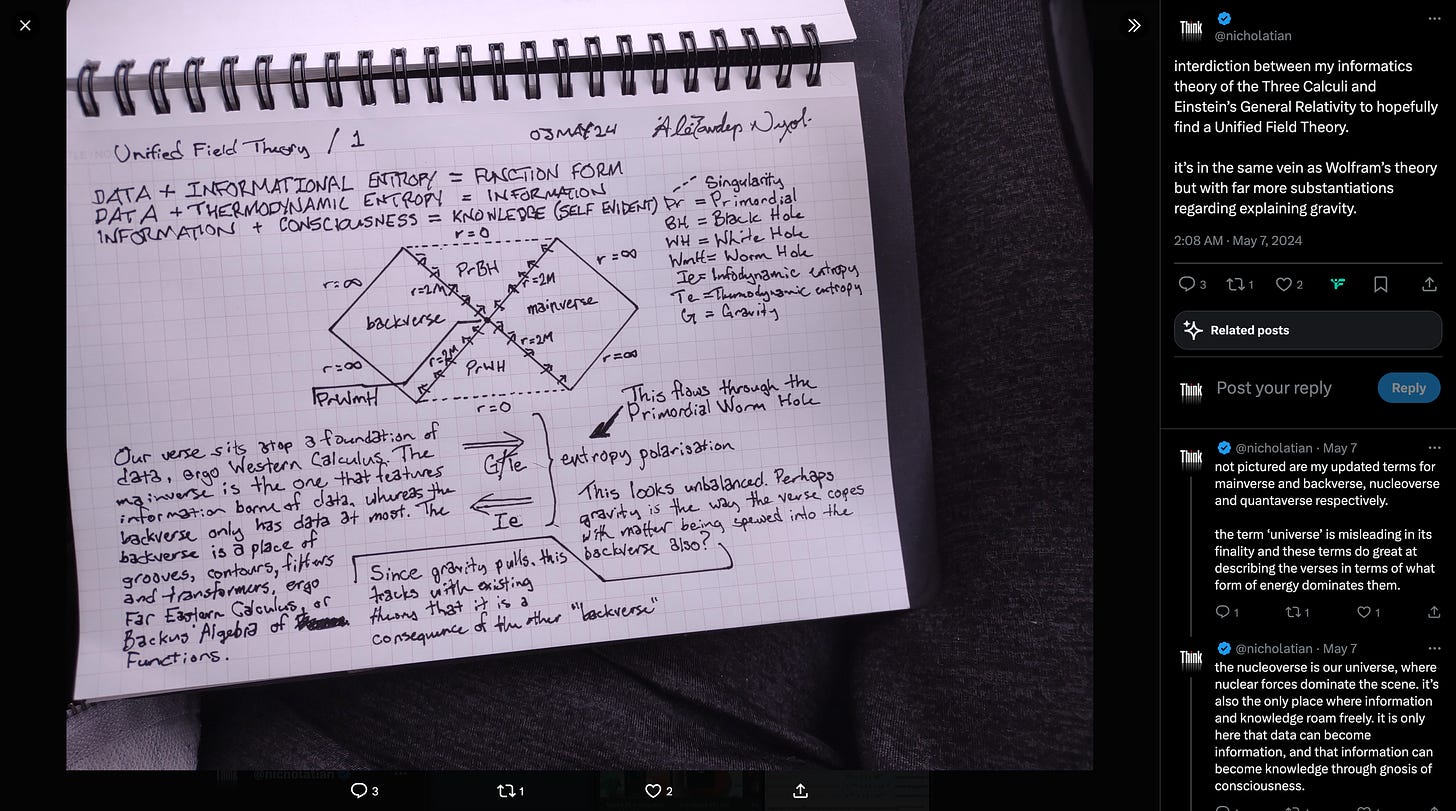I’m not one to fixate on habit streaks, but June of this year marks the first full calendar month in a while that I haven’t published an article here. I feel a bit bad about that, even though I know I put out a higher volume of higher quality work than most weblog authors out there do, so I don’t sweat it too much. Today I’m going to review in cliff notes what I’ve been up to professionally. It partially explains the absence, but don’t take it as an apology for the lack of volume. I’m going to tell you about important things that have come to pass or will soon in the future, because my life is a roller coaster, and it demands accounting.
I got illegally fired twice in a row within the last 3 months. I will spare you every detail since litigation is pending, but suffice to say this has really hurt me financially. This misfortune transpired atop a mountain of credit card debt accrued from a failed joint financial operation with a close family member I was living with until early this year. That escapade involved three vehicles getting totalled and a fourth being incapacitated by a shot transmission, with our only remaining car limping along at 260,000 km. To say all of this has been stressful is an understatement.
Getting illegally fired has really helped me change how I think about others in a good way. It has dashed a lot of my hereditarian romanticism and underscored the price I pay by deferring short-term gains for long-term ones. Quite simply, 90% of people are just plain untrustworthy. A surprising number are downright insane, and I see most people coping with this by shutting themselves down more or less permanently.

If I could distill these experiences down to one big punch line of a lesson, it would be this: people don’t really need a reason. One of my biggest youthful misconceptions is that people run on incentives and structures built thereupon, meaning that they need a reason to do the things they do, even if the reason may be totally subconscious, irrational, or whathaveyou. I no longer believe this.
It’s not like it’s strictly false, because you can psychologise anyone enough to hypothesise a reason involving childhood trauma to make sense of things that don’t make sense. But this is unhelpful. It does me no favours practically and informs my strategy none to say these things about them – I might as well have said they are demons or are simply insane. All of the potentials and outcomes would be the same for me.
Understanding the extraneousness of this psychologising has made it so much easier for me to come right out to the more correct conclusion and say, “these people are insane.” From there it’s a cakewalk to think like Captain Janeway and begin evasive manoeuvres, or even more direct forms of combat as the situation may require. I’m ready for this as I am tired of getting knocked on my ass by people who are quite plainly evil. God has given me these blessings in that the manners in which I was fired violated the law, so that if I have courage and righteousness I may pursue them to great effect in court. From here, I can grow into an angel that fights back – one who never starts fights, but is a master at finishing them. I’m looking forward to that.
Lately, I have started to better appreciate my standing in the world in a grounded way. This has encouraged me by revealing to me the magnitude of my gifts, and humbled me by helping me see how others flatten and pigeonhole me as well. I am incredibly physically blessed in many ways and have never been more conscious of that, so I hope to have a better time than ever leveraging those gifts of mine to my own benefit. I hope to fumble my standing and friendships a lot less now that I have begun to see how others limit and size me up, recognising how certain strategies of dealing with people don’t work very well in my hands.
Overall, I am becoming wise in a deep way to where my place is in the world, not just aspirationally but as a concrete fact of my current life. I can see who I am and who I aspire to be in the same frame for the first time. This is exciting.
Besides those personal development breakthroughs, I have also made immense breakthroughs in the depth of my informatics work. I was going to write about it here earlier in June, but I decided this is worth trying to publish a proper academic paper for: I created the software modular memory technique, which provides the first efficient solutions to several classes of memory bugs. Projects like Chrome’s V8 use costly techniques like control-flow integrity to achieve stronger separation of ownership in memory management, and palliative techniques like fuzzing and address sanitisation to prevent memory leaks. Not only does my technique solve these problems by virtue of its constitution for free, but it does so without depending on any complex hardware utilities like hypervisors or memory management unit meddling.
Incredibly, it has the added side effect of making it practical to leverage large amounts of memory with narrow pointer bandwidths without compromising the expressiveness of the algorithms being implemented. This means it is no longer awkward/unworkable to use large amounts of memory in x86’s real mode due to segment register shenanigans. It is then practical to write programs in a high-level language such as C that leverage expanded or extended memory totally transparently.
This breakthrough is substantive and mature enough that I decided a few weeks ago to challenge myself enough to produce a paper for ArXiV with a working proof-of-concept on GitHub. Hopefully it won’t take me too long to get to this, since… you know… my world is on fire these days.
The other big breakthrough has been somewhat of an accident of collaboration: my husband and a physicist friend of his and I have been discussing with great excitement the interdiction my informatics theory—specifically my Three Calculi—has with our latest understanding of Einsteinian unified field theory. I have hinted at this with a sketch once on X.com:
I continue to develop an idea that Einstein’s theorised “parallel universe” is actually a kind of ‘backend’ to our universe which I call the quantaverse, where an undifferentiated proto-quark matter spit out by the primordial white hole cannot graduate into matter like it does in our nucleoverse. What it does instead is coalesce to form real functions. In our world, functions arise from the knowledge of their existence coupled with a coding of them, i.e. a symbol that we collectively decide represents an actual function we see at work in the real world in some way. We do this because real functions cannot exist in our nucleoverse as they would instead graduate into matter. We know about real functions because they exist in a self-evident yet indirect way in the form of the four fundamental physical forces we already know. ‘Quantaverse’ and ‘nucleoverse’ are terms to avoid the ambiguous ‘universe’, and refer to each part by identifying the dominant constitution of energy in each. ‘Nucleoverse’ merely refers to how matter is clumped together into nuclei, without any special regard for the strong and weak nuclear forces.
Existing quantum theory has grazed this subject but in a very naïve and uncompelling way, chiefly in the form of the current theory about operators. If this theory of mine proves to be correct, I can only say it escaped notice until now because of the counterintuitive approach it necessitates regarding the reality of function and the concreteness of mathematics itself. When you spend too long with it, math will start to play tricks on you – many great physicists hated math as an end even as they used it to great effect in their physics work. In fact, they were simply trying to intuit and discover the truth of the Universe, and math is the handle of the lever for them to do this.
John Backus did not realise it any more than I did until now, but his work on function-level programming, ergo the algebra of functions themselves, what I call the Far Eastern Calculus, would shape up to be the most compelling candidate for a unified quantum field theory yet. In talking with my physicist compatriots, we have also come to suspect that this theory will come to explain ‘dark energy’ so thoroughly that it will extinguish the term out of the scientific window like Einstein extinguished the term ‘luminiferous aether’.
Irrespective of my works, however, it needs to be mentioned due to my intersecting of physics and informatics that the existing field of quantum computing rooted in ‘qubits’ is a mistake. I don’t know how to explain this happening besides through the political reality of institutional self-cannibalisation, but the simple fact about qubits is that they don’t meaningfully exist any more than strings do. We seem to have forgotten that theoretical constructs are only useful inasmuch as they explain the real world. String theory errs in trying to add more dimensions to math that doesn’t work, and the qubit idea errs even more parochially in that it constitutes a crude shoehorning of classical computing into the quantum domain. People chatter constantly about Shor’s algorithm because it represents an Excalibur to cheat God, but it will never come to exist, because you cannot cheat God, period. This forms a giant social obstacle to any real progress in defining, let alone exploiting, the reality of any actually quantum computing. I can only hope that the funding for this necrosis of academia dries up with haste.
The air conditioning in my house broke yesterday, and I am too European to be able to bear sleeping in the heat without achieving total exhaustion first. Many belated fortunes await me down the road. For now, my main challenge from God seems to be to stress my patience very, very far, probably in the hopes that it will make it vastly easier for me to deal when the stakes are high down the line. I am too ambitious to afford to lose many big chances, so I am very happy to take this suffering early (and for free!). I’m doing it gladly and in some narrow ways am already being rewarded for it. Please wish me luck! Thanks for checking in on me.





